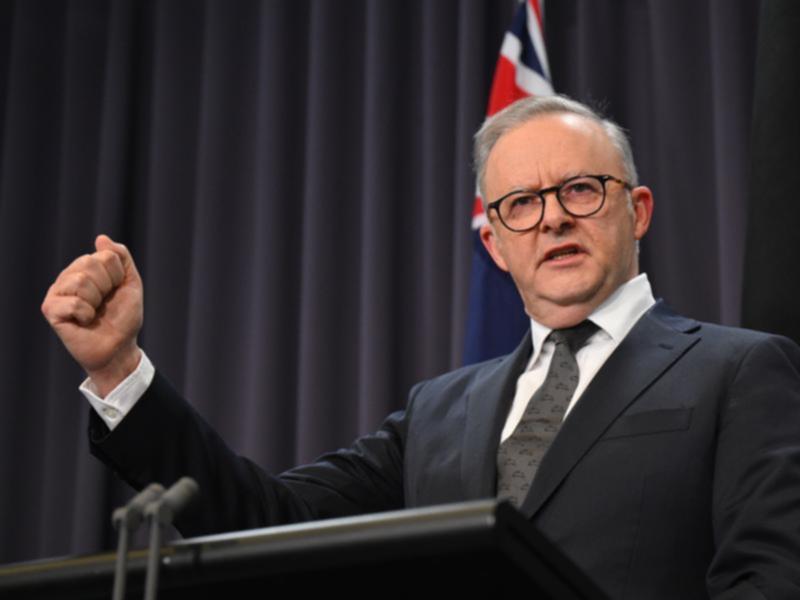RBA governor Michele Bullock doubles down on inflation warning as Anthony Albanese denies ‘brawling’
Michele Bullock has renewed her commitment to get inflation back under control as the PM denies his government is ‘brawling’ with the RBA.
Prime Minister Anthony Albanese has denied his government and the Reserve Bank are “brawling” over the impact public spending is having on inflation, as the governor doubled down on her determination to get prices back under control.
In a speech in Armidale on Thursday, Michele Bullock reinforced why the board had weighed lifting the official cash rate during its meeting this week, before deciding to hold it steady at 4.35 per cent and dampen hopes of any rate cuts in the next six months.
She also declared the bank “will not hesitate” to raise rates again if it needs to.
Sign up to The Nightly's newsletters.
Get the first look at the digital newspaper, curated daily stories and breaking headlines delivered to your inbox.
By continuing you agree to our Terms and Privacy Policy.Ms Bullock said while the 12 rate hikes throughout 2022 and 2023 lowered demand because they restricted the cash mortgage and loan holders had to splash, the gap between demand and supply in the economy had become larger than previously forecast.
“Higher interest rates also reduce incentives to borrow, lower the demand by firms to invest, support the exchange rate, and by themselves weigh on asset prices and hence wealth. All these effects lead to lower growth of demand in the economy, thereby helping to bring it back into better balance with supply,” she said.
Ms Bullock said while the most recent quarterly inflation data was lower than last year and weaker than expected, it remained too high because demand was still higher than the economy’s ability to supply.
“A key point to make here is that demand recovered very strongly after the pandemic. So even though demand growth has been fairly weak recently, the slowing has not been enough to restore balance in the economy,” she said.
“Although growth … has been weak, estimates suggest that the gap between aggregate demand and aggregate supply in the economy is larger than previously thought, and that is resulting in persistent inflation.”
And crucially, because the board also predicts the growth of demand to pick up over the next year, persistent, “sticky” inflation will remain a major issue for the bank, and the economy.
“The effect of this … (is) we don’t expect to be back in the two to three per cent target range until the end of 2025, over a year away. This is why the Board explicitly considered whether another interest rate rise was required to ensure inflation continues to decline,” Ms Bullock said.
“The Board … will not hesitate to raise rates if it needs to.”
Public demand is of particular concern, and the central bank said as much in its statement of monetary policy this week that it was “forecast to be stronger than previously expected, reflecting recent public spending announcements by federal and state governments”.

Mr Albanese had earlier denied the RBA had “taken a shot” at Labor’s spending, or that the Government and bank weren’t on the same page.
As he announced a $3.6 billion package to increase wages by 15 per cent for early childcare workers, which will flow through to childcare fees, Mr Albanese said inflation had “a range of aspects”, and the Government had made reforms which put “downward pressure” on prices.
“Whether it be our energy price relief plan, or cheaper childcare, fee-free TAFE, these measures are designed in a way to assist people who are doing it tough, whilst we make sure that we continue to moderate inflation,” he told Sky News.
“But the other thing we’ve done, is we’ve made sure Budget policy works arm-in-arm with monetary policy by providing two budget surpluses. That is what we’re doing, and that’s what we’ll continue to do.”
Shadow Treasurer Angus Taylor was earlier asked what public funding the Coalition would cut if it were in government.
“The key here is not slash and burn. The key here is to make sure your economy grows faster than your spending. That is the fiscal strategy,” he said.
He wouldn’t give specifics but suggested spending needed to be scaled back on “multiple fronts”.
During Ms Bullock’s speech on Thursday, she paid tribute to regional communities and the disproportionate effect monetary policy was having on different parts of the country.
She also spoke of the impact of climate change and the changes made to mitigate its risk, saying it would lead to structural economic changes.
“Regional Australia will play a critical role in (the clean energy) transition ... this will present many challenges, but installing this capacity, and the infrastructure to support it, will ultimately increase investment in regional communities,” she said.
“This investment should bring with it significant economic benefits. There are certainly opportunities here, and some good reasons for optimism about the future of many of our regions.”

